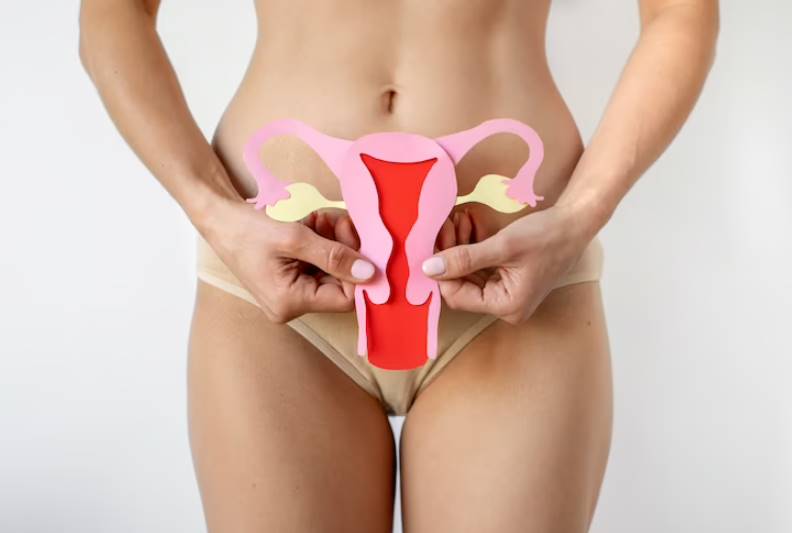A fat uterus, also known as endometrial hyperplasia, is a condition that affects women during their reproductive years. It occurs when the uterine lining, called the endometrium, thickens beyond its usual thickness.
This condition is not only uncomfortable, but it may also be a sign of more serious health issues. In this article, we will discuss the causes, symptoms, and treatment options for a fat uterus.
Understanding Endometrial Hyperplasia
The uterus is a female reproductive organ that is responsible for carrying a fertilized egg to term. The endometrium is the lining of the uterus that thickens and prepares for pregnancy every month.
When the endometrium becomes too thick, it is known as endometrial hyperplasia or a fat uterus. This condition happens when there is an imbalance of estrogen and progesterone in the body.

Causes of a Fat Uterus
Several factors can contribute to endometrial hyperplasia. The most common cause is an excess of estrogen in the body. This can happen due to hormonal imbalances such as polycystic ovary syndrome (PCOS), obesity, or taking estrogen replacement therapy. Other causes may include diabetes, thyroid problems, or tamoxifen use.
Obesity: Women who are overweight or obese have a higher risk of developing endometrial hyperplasia due to an increase in estrogen levels. This creates an environment where the body produces more estrogen than progesterone, which thickens the uterine lining.
Hormonal Imbalance: Hormonal imbalances due to conditions such as PCOS can lead to a fat uterus. PCOS is a condition in which the ovaries produce too much androgen, a male hormone, which can lead to irregular periods and an overgrowth of the endometrium.
Symptoms of a Fat Uterus
The symptoms of endometrial hyperplasia can vary depending on the severity of the condition. Some women may experience no symptoms at all, while others may experience:
- Heavy or prolonged periods
- Bleeding between periods
- Spotting after menopause
- Abdominal pain or cramping
It is important to see a doctor if you experience any of these symptoms, as they could be a sign of more serious conditions such as endometrial cancer.
Diagnosis and Treatment of a Fat Uterus
If you are experiencing any of the symptoms mentioned above, it is important to see a doctor for a proper diagnosis. Your doctor may perform a pelvic exam, an ultrasound, or a biopsy to determine if you have endometrial hyperplasia or any other conditions that may be causing your symptoms.
Treatment for a fat uterus depends on the severity and underlying cause of the condition. In some cases, observation alone may be recommended if the condition is mild. However, if the condition is more severe, treatment options may include:
Hormonal therapy: This treatment involves the use of progesterone to balance the estrogen levels in the body and reduce the thickness of the uterine lining.
Surgery: If the condition is severe or there is an increased risk of cancer, surgery may be necessary. This may include a hysterectomy, which involves removing the uterus and sometimes the ovaries.
Prevention of a Fat Uterus
The best way to prevent a fat uterus is to maintain a healthy weight and exercise regularly. This can help regulate hormone levels and decrease the risk of developing endometrial hyperplasia. Additionally, managing underlying conditions such as diabetes or thyroid issues can also help prevent this condition.
Conclusion
A fat uterus, or endometrial hyperplasia, is a condition that can cause discomfort and be a sign of more serious health issues. It is important to understand the causes, symptoms, and treatment options for this condition in order to properly manage it. If you are experiencing any symptoms related to a fat uterus, it is important to see a doctor as soon as possible. With proper diagnosis and treatment, this condition can be managed successfully.
FAQs – Fat Uterus
1. What are the common causes of a fat uterus?
A fat uterus can be caused by various factors, including hormonal imbalances, obesity, polycystic ovary syndrome (PCOS), and uterine fibroids. Other causes may include endometrial hyperplasia, adenomyosis, or chronic inflammation.
2. What are the symptoms of a fat uterus?
Symptoms of a fat uterus can include heavy or prolonged menstrual bleeding, pelvic pain, lower back pain, bloating, frequent urination, constipation, and difficulty conceiving. In some cases, there may be no noticeable symptoms.
3. How is a fat uterus diagnosed?
A healthcare provider may diagnose a fat uterus through a combination of physical examination, medical history, and imaging tests such as ultrasound or magnetic resonance imaging (MRI). In some cases, a biopsy may be required to confirm the diagnosis.
4. What are the potential complications of a fat uterus?
If left untreated, a fat uterus can lead to complications such as anemia, severe pain, infertility, and an increased risk of developing endometrial cancer.
5. What are the treatment options for a fat uterus?
Treatment options for a fat uterus depend on the underlying cause and severity of symptoms. Treatments may include hormonal therapy, nonsteroidal anti-inflammatory drugs (NSAIDs), and lifestyle changes such as weight loss and exercise. In more severe cases, surgical interventions such as myomectomy, endometrial ablation, or hysterectomy may be necessary.
6. Can a fat uterus affect fertility?
Yes, a fat uterus can potentially affect fertility, especially if it is caused by conditions like PCOS or uterine fibroids. It is important to discuss your concerns with a healthcare professional if you are trying to conceive and suspect you may have a fat uterus.
7. Is it possible to prevent a fat uterus?
While it may not be possible to prevent all cases of a fat uterus, maintaining a healthy lifestyle through regular exercise, a balanced diet, and maintaining a healthy weight can help reduce the risk of developing certain conditions that can lead to a fat uterus.
8. When should I consult a healthcare professional about a fat uterus?
If you experience symptoms such as heavy or prolonged menstrual bleeding, severe pelvic pain, or difficulty conceiving, it is essential to consult a healthcare professional for proper evaluation and diagnosis. Early detection and treatment can help prevent complications and improve overall health outcomes.


















